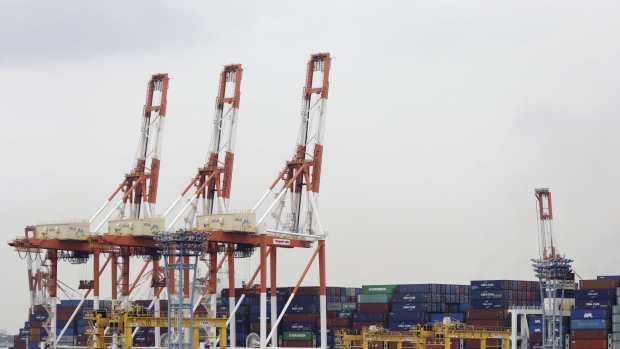Jul 23, 2019
Once Feared Dead, Globalization Is Still Very Much Alive
, Bloomberg News

(Bloomberg) -- Want to receive this post in your inbox every day? Sign up for the Terms of Trade newsletter, and follow Bloomberg Economics on Twitter for more.
The rumors of globalization’s death are exaggerated.
That’s the conclusion of Bloomberg’s just-published analysis that spells out the various ways global trade flows have been evolving long before U.S. President Donald Trump imposed his first tariffs.
The conclusion: We’re more exposed to the global products, services, ideas and people than ever — just in different ways:
- How much stuff we ship around the world is not the best measure of globalization. The trade in goods may be slowing, but that’s an incomplete picture that doesn’t capture the digital realm.
- Traditional trade measures also don’t reflect the real supply chain. A more accurate measure of trade and economic relationships involves not where a product is made but where its value is added.
- Companies are more multinational than ever. China hawks in Washington, for instance would welcome “decoupling” of the U.S. and Chinese economies. But with such large markets abroad, few in business see that as a realistic prospect.
- Trump’s tariffs are the exception, not the rule. As he erects trade barriers, most of the U.S.’s main trading partners are continuing to lower import duties and sign deals.
- Innovation is increasingly global. At the center of U.S. complaints about China is intellectual property and what the U.S. argues is a long and systematic pattern of IP theft encouraged by the Chinese state. But increasingly experts say the incentives are changing for China.
Charting the Trade War
As the European Central Bank prepares to inject more stimulus into the economy, Bloomberg Economics calculates that 7.6% of euro-area activity is directly exposed to trade with the U.K., U.S. and China. Given the scale of these risks and the toll they are already taking on sentiment, it’s unlikely the ECB will wait until they fully materialize before taking action.
Today’s Must Reads
- High-tech summit | A White House meeting between tech chief executives and administration officials marks another step toward easing a ban on sales to China’s Huawei Technologies.
- Grapes of wrath | California’s signature wine industry is suffering from the tit-for-tat tariffs between the U.S. and China, souring business relationships and markets that took years to develop.
- Port dreams | With $2 billion in infrastructure investment, Paraguay plans to turn its remove northwest into an international transport hub linking ports on the Atlantic and Pacific.
- Car failure | Germany’s Continental AG cut its earnings outlook as the car-parts giant emerges as the latest industrial victim of trade woes tied to weaker Chinese demand.
- Hormuz or bust | A firsthand account from a tanker captain navigating the Persian Gulf and the Strait of Hormuz, the passageway for a third of the world’s seaborne petroleum.
Economic Analysis
- Global tariffs | Global trade restrictions remain at historically high levels amid tariff conflicts.
- Tax man cometh | A decision is coming soon on who will become the next EU tax commissioner.
Coming Up
- July 23-24: WTO General Council meeting
- July 25: Hong Kong trade balance, CPB monthly world trade monitor
Like Terms of Trade?
Don’t keep it to yourself. Colleagues and friends can sign up here. We also publish Balance of Power, a daily briefing on the latest in global politics.
For even more: Subscribe to Bloomberg All Access for full global news coverage and two in-depth daily newsletters, The Bloomberg Open and The Bloomberg Close.
WhatsApp: Join us on WhatsApp to get news, insight and analysis of the day’s top stories. Sign up here.
How are we doing? We want to hear what you think about this newsletter. Let our trade tsar know.
To contact the author of this story: Shawn Donnan in Washington at sdonnan@bloomberg.net
To contact the editor responsible for this story: Brendan Murray at brmurray@bloomberg.net, Zoe Schneeweiss
©2019 Bloomberg L.P.